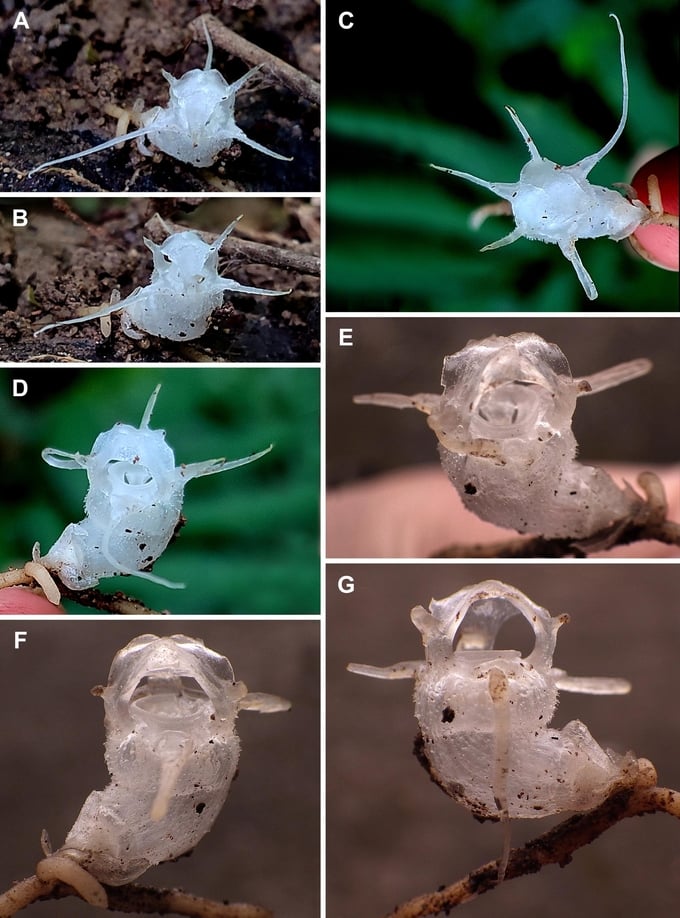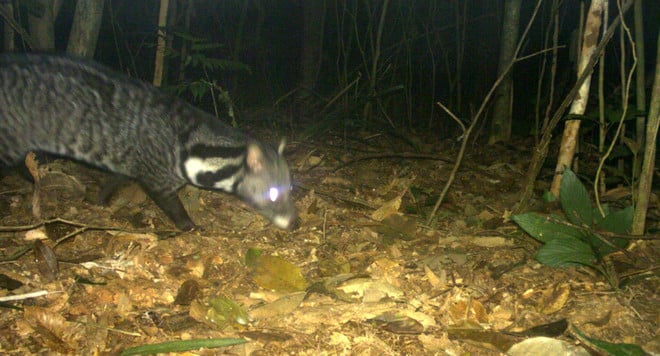May 21, 2025 | 03:39 GMT +7
May 21, 2025 | 03:39 GMT +7
Hotline: 0913.378.918
May 21, 2025 | 03:39 GMT +7
Hotline: 0913.378.918
During an ecological and biodiversity survey in October 2023, scientists from the Vietnam-Russia Joint Research Team (Vietnam-Russia Tropical Center and Moscow State University, Russian Federation) and researchers from the Xuan Lien Nature Reserve recorded a new plant species, Thismia papillata.

The only non-photosynthetic plant discovered in Xuan Lien Nature Reserve. Photo: Vietnam - Russian Tropical Center.
This species was officially published in the journal Phytotaxa in June 2024. To date, it is the only non-photosynthetic plant discovered in Xuan Lien Nature Reserve, found in primary forests at an altitude of 800 meters above sea level (Ban Vin, Bat Mot Commune, Thuong Xuan District, Thanh Hoa Province).
Typically, chlorophyllous plants synthesize nutrients through photosynthesis. Most non-photosynthetic plants, however, rely on symbiotic relationships with fungi to obtain nutrients, a process known as mycoheterotrophy.
Thismia papillata, belonging to the genus Thismia (family Thismiaceae), is a tiny herbaceous plant that forms a symbiotic relationship with fungi. It has a slightly succulent stem, fibrous roots, and thrives in moderately humid terrestrial habitats. Its flowering stems are about 1 mm long, bearing a single flower at the tip, surrounded by three bracts. The leaves are small, either alternate or opposite, reduced to triangular or ovate scales, smooth, chlorophyll-free, and about 2 mm long. The bracts are pale white, obovate, smooth, and 4.0-4.9 mm long, tightly attached to the flower base.
The bisexual flowers, pale white and about 13 mm long, are cup-shaped with a slight tilt. The outer surface of the flowers features prominent papillae, with the structure bending at a 90° angle. The stamens form a curved tube resembling a boot, while the ovary is multilocular. Flowers bloom in October.
The most distinct characteristic of Thismia papillata compared to other species in the genus Thismia lies in the morphology of the external and internal perianth appendages. The inner perianth segments fuse into a cap-like structure, while the outer appendages are 15 mm long, and the inner appendages measure 9 mm.
Globally, scientists have identified 109 species in the genus Thismia, most of which are distributed across tropical and subtropical Asia, temperate Australia, and the Americas. In Vietnam, six species of Thismia have been recorded, all found in regions south of Quang Tri. The discovery of T. papillata in Xuan Lien Nature Reserve marks the first record of this genus at the northernmost latitude in Vietnam.
In recent years, many new species of flora and fauna have been discovered in Xuan Lien Nature Reserve, including numerous species of high conservation value. The discovery of T. papillata, a non-photosynthetic plant, adds further evidence that Xuan Lien is one of Vietnam's most biologically diverse and ecologically significant protected areas. Further research and assessments are needed to maximize the ecological, environmental, and biodiversity value of Xuan Lien Nature Reserve.

In recent years, many new species of flora and fauna have been discovered in Xuan Lien Nature Reserve. Photo: VNA.
Translated by Kieu Chi

(VAN) In 2024, over 295 million people across 53 countries and territories faced acute hunger—an increase of almost 14 million people compared to 2023, while the number of people facing catastrophic levels of hunger reached a record high.

(VAN) World Environment Day 2025 (June 5) carries the theme 'Beat Plastic Pollution' continuing to emphasize the global urgency of addressing the plastic waste crisis.

(VAN) This was the assessment shared by experts at the workshop titled 'Assessing the Role and Potential of Low-Emission Rice Production Systems in Vietnam,' held on the morning of May 19.

(VAN) Cai Rong Port is the fisheries control center of Quang Ninh, helping to monitor fishing vessels, combat IUU fishing, and remove the EC's 'yellow card'.

(VAN) The German Agricultural Society (DLG) explores the possibility of establishing a mechanization service center in Vietnam’s Mekong Delta to support farmers in accessing and utilizing advanced machinery.

(VAN) On May 16, the Department of Water Resources Management, in collaboration with the Food and Agriculture Organization of the United Nations (FAO), held a signing ceremony for the GEF-8 project document.

(VAN) Food safety, mechanization, vocational training, and market opening are key areas of cooperation expected between the Vietnamese Government and the Federal Republic of Germany.